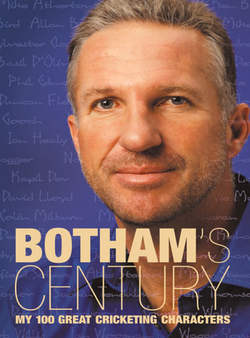Читать книгу Botham’s Century: My 100 great cricketing characters - Ian Botham, Ian Botham - Страница 5
Curtly Ambrose
Оглавление‘Hey, Beefy, man.’ The drawl could only have belonged to His Royal Highness King (later Sir) Vivian Richards.
‘Yes, Smokes,’ I replied.
‘Beefy, you know Big Bird is retiring.’
The year was 1986 and I had indeed heard that Joel Garner, my buddy from Somerset and my enemy on the pitch in matches between the West Indies and England, had decided to call it a day, and it goes without saying I was gutted that I would never again have the pleasure of taking my life in my hands against him on a cricket field.
‘Yes, Viv.’ I said. ‘Shame.’
‘Well, Beef, don’t fret. We got another. Only problem is he don’t like cricket. Jeez, Beefy … he wants to play baaasketbaall, man.’
If only. If only. All those hours of torment for England batsmen might never have happened. Then again, world cricket would have been immeasurably poorer for Curtly Ambrose’s absence.
The good people of his tiny home village of Swetes in Antigua may have grown a mite tired of it, but the sight and sound of Curtly’s mum ringing the bell outside her house every time the radio told her that her boy had struck again for the West Indies is one of the great romantic images of the modern game.
Over the years from his debut against Pakistan in 1987 to the moment at the end of the 2000 series against England at The Oval when he and his partner Courtney Walsh were afforded the rare honour of a standing ovation from opponents and spectators alike, the bell tolled for the best batsmen in world cricket, for some over and over again – in total more than 300 times – Curtly’s partnership with the giant gentleman Jamaican, based as much on profound mutual respect as acute inter-island and personal rivalry, was one of the most penetrative of all time.
The abiding impression I had of Amby as a bowler and an opponent was that, for a cricketer who thrived on aggression and menace, he was one of the quietest I ever encountered. Sometimes, even in a moment of great triumph ‘long bones’ appeared the most reluctant and detached of heroes.
I can honestly say that in the Test arena I never saw him bowl badly. Of course, he was miserly accurate. Of course, he had the stamina of a horse. Of course, he never seemed to give you anything to hit, and of course, when the mood took him as it did when he obliterated Mike Atherton’s England side for 46 at Port of Spain in 1994, he could be as unforgiving and as devastating as a hurricane. In certain conditions at his peak he was virtually unplayable. But maybe, of all these weapons, the most potent was his silence.
Curtly never said much on the field and off it, particularly to the press; practically nothing. The fact is that he never needed to. Many bowlers have tried to put batsmen off their stroke by utilizing various forms of verbal and physical intimidation. Curtly intimidated you with hush.
On the field, even the idea of sledging was just a waste of energy, time and breath to him. When a batsman played and missed, instead of blathering on about it as some did, the usual response was either a ‘tut-tut’, a flash of the widest, toothiest grin in the game, or a perplexed raise of the eyebrow as if to enquire: ‘Can you really be as bad as you look?’
As for King Curt’s attitude to the media, and his mischievous sense of humour, it is best summed up for me by a story I heard concerning the attempts of one of Her Majesty’s press to interview him during the West Indies’ tour to England in 1991. The News of the World instructed their man David Norrie to find Amby and get him to bare his soul. Norrie, aware of the generally-held belief that it was almost impossible to persuade Curtly to open his mouth, let alone his heart, decided he had better try to enlist some help. Having had some dealings with Viv Richards over the years, the intrepid newshound approached the Masterblaster outside the dressing room in Swansea and asked if he would mind asking Curtly if he would spare him a few minutes of his valuable time for an interview. Viv said he would do his best and advised Norrie to wait. Soon afterwards, the huge figure of Curtly came to the dressing-room door and the reporter reached for his notebook, understandably elated that his ingenious approach had enabled him to crack the toughest nut in the game.
‘You want to talk to me?’ asked Curtly.
‘Yes I do,’ replied Norrie.
‘OK. This is how it works. You want to talk to Viv, you ask Viv. You want to talk to Curtly, you ask Curtly’
‘Fine,’ said Norrie, ‘I follow you. Sorry about the misunderstanding. I thought it might be better if I went through Viv.’
‘Fine,’ said Curtly. ‘No problem.’
‘Fine,’ said Norrie. ‘So, can I talk to you?’
‘No,’ said Curtly, ‘Curtly talks to no one.’
I can still hear the big man cackling now as he does every time he reminds me of the famous incident at the Oval in 1991, when Jonathan Agnew and Brian Johnston immortalized my failed attempt at getting my leg over the stumps against his bowling.
Interestingly, he saved some of his fiercest stuff for his fellow West Indians; either in Caribbean domestic cricket for the Leewards, or in the county championship for Northamptonshire, and I believe that was because, like Viv and Andy Roberts before him, he was immensely proud of being able to place the name of one of the smallest of those islands on the sporting map.
